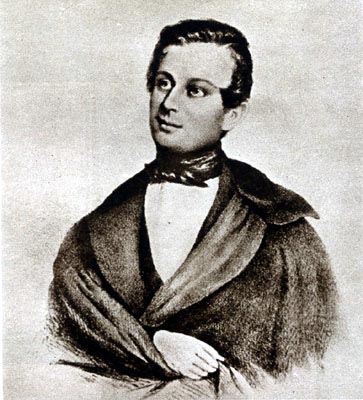<Back to Index>
- Physicist Nikolai Alekseevich Umov, 1846
- Writer Josef Kajetán Tyl, 1808
- 1st President of Germany Friedrich Ebert, 1871
PAGE SPONSOR

Josef Kajetán Tyl (4 February 1808, Kutná Hora – 11 July 1856, Pilsen) was a significant Czech dramatist, writer and actor. He was a notable figure of the Czech National Revival movement and is best known as the author of the current national anthem of the Czech Republic titled Kde domov můj.
Josef Kajetán Tyl was the first-born son of Jiří Tyl, a tailor and retired military band oboe player, and his wife Barbora née Králíková, daughter of a miller and groats maker. He was christened Josef František, yet this name was changed into Josef Kajetán when he underwent confirmation at the age of eleven. The family surname had several written forms - Tylly, Tylli, Tilly or Tyll - and was later changed to Tyl. Josef Kajetán had four younger siblings: one brother and three sisters, but except sister Anna none of them survived to adulthood. After finishing elementary school, Josef Kajetán studied at a grammar school in Prague and in Hradec Králové. Among his teachers belonged the leading Czech linguist and writer Josef Jungmann and the playwright Václav Kliment Klicpera. After finishing his studies at the grammar school, he started to study philosophy in Prague.
Already as a student, Tyl started to be active in theatre and finally left school to become a member of the Hilmer travelling theatre company. When the company disbanded after two years of journeying around the countryside, he returned to Prague and got a job as a clerk in an infantry regiment's office. In his free time he wrote theatre plays and worked as an actor at the Estates Theatre. Due to his abilities he could leave his job in the military in 1842, as he was given a full time job at the Estates Theatre, where he became the director, organizer and playwright of the Czech ensemble in the otherwise mainly German theatre.
In 1833 Tyl became a redactor of a renewed Czech magazine called Květy (Blossoms), which exists until today. He was also a redactor of the magazines Vlastimil and Pražský posel (Prague Messenger), and of the newspaper Sedlské noviny (Peasant newspapers), that were later banned because of their political involvement. Tyl used several pen names that were often derived from the name of his home town Kutná Hora, for example Horský, Horník, Kutnohorský and Vítek.
In the revolutionary year 1848 Tyl became politically active and was briefly a member of the Austrian parliament in Vienna. Because he fought for the independence of the Czech nation from the Austrian-Hungarian Empire, he was later marked as politically unreliable by the authorities and expelled from the Estates Theatre. He wanted to found his own travelling theatre company but his request was rejected, so in 1851 he joined an existing one and left for a tour, together with his family. Yet the theatre company did not fare well, and the Tyl family ended up in poverty. In 1856, during his theatre's stay in Pilsen, the 48 years old Tyl died of an unknown illness and was buried at a local cemetery.
A theatre in Pilsen was later named in his honor Divadlo Josefa Kajetána Tyla. Tyl's wife was a Czech actress Magdalena Forchheimová (1803 – 1870), who performed under the pen name Skalná.
Tyl met her in 1829 during his first tour with a travelling theatre
company, where they both performed. They married on 28 January 1839,
yet their marriage stayed childless, as after a still birth Magdalena
couldn't have any more children. In 1841 Tyl fell in love with his
wife's much younger sister Anna, who was also a talented actress and
performed under the pen name Anna Rajská (1824
– 1903). They started an affair; Tyl did not divorce or leave his wife,
however, and all three of them lived together in one household till his
death. Anna bore her brother-in-law eight illegitimate children,
their youngest son was born one month after Tyl died. Their sons went
by their mother's surname Forchheim, daughters were allowed by the
authorities to use their father's surname Tyl. On 24 April 1861, five years after Tyl's death, Anna married Tyl's colleague, actor Josef Ladislav Turnovský,
with whom she had three more children. Turnovský took care not
only of Tyl's family but also of his legacy by saving his manuscripts and publishing his works.